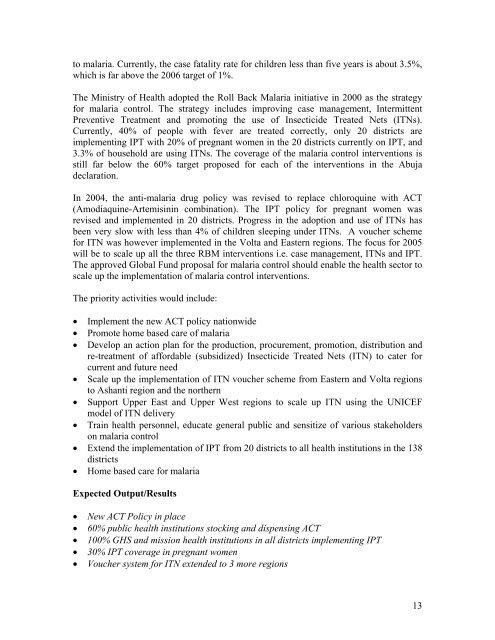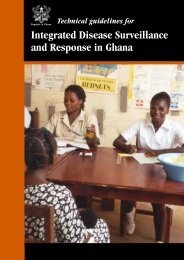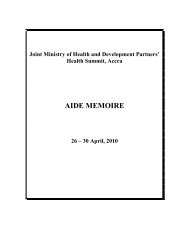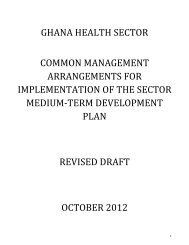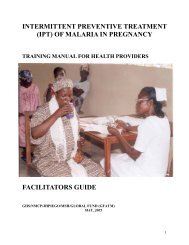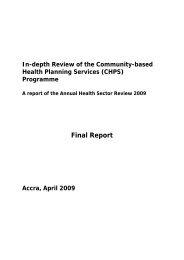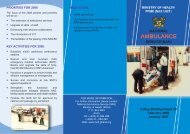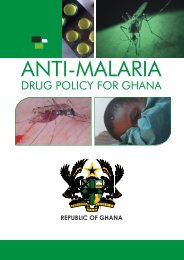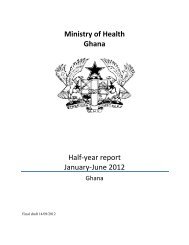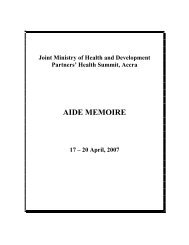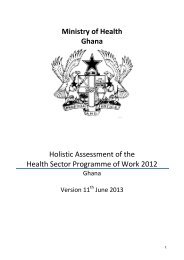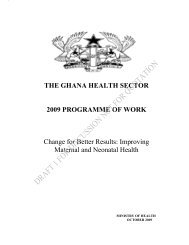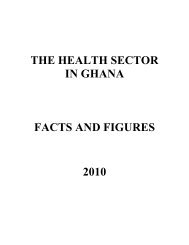Annual Programme of Work 2005 - Ministry of Health
Annual Programme of Work 2005 - Ministry of Health
Annual Programme of Work 2005 - Ministry of Health
Create successful ePaper yourself
Turn your PDF publications into a flip-book with our unique Google optimized e-Paper software.
to malaria. Currently, the case fatality rate for children less than five years is about 3.5%,<br />
which is far above the 2006 target <strong>of</strong> 1%.<br />
The <strong>Ministry</strong> <strong>of</strong> <strong>Health</strong> adopted the Roll Back Malaria initiative in 2000 as the strategy<br />
for malaria control. The strategy includes improving case management, Intermittent<br />
Preventive Treatment and promoting the use <strong>of</strong> Insecticide Treated Nets (ITNs).<br />
Currently, 40% <strong>of</strong> people with fever are treated correctly, only 20 districts are<br />
implementing IPT with 20% <strong>of</strong> pregnant women in the 20 districts currently on IPT, and<br />
3.3% <strong>of</strong> household are using ITNs. The coverage <strong>of</strong> the malaria control interventions is<br />
still far below the 60% target proposed for each <strong>of</strong> the interventions in the Abuja<br />
declaration.<br />
In 2004, the anti-malaria drug policy was revised to replace chloroquine with ACT<br />
(Amodiaquine-Artemisinin combination). The IPT policy for pregnant women was<br />
revised and implemented in 20 districts. Progress in the adoption and use <strong>of</strong> ITNs has<br />
been very slow with less than 4% <strong>of</strong> children sleeping under ITNs. A voucher scheme<br />
for ITN was however implemented in the Volta and Eastern regions. The focus for <strong>2005</strong><br />
will be to scale up all the three RBM interventions i.e. case management, ITNs and IPT.<br />
The approved Global Fund proposal for malaria control should enable the health sector to<br />
scale up the implementation <strong>of</strong> malaria control interventions.<br />
The priority activities would include:<br />
• Implement the new ACT policy nationwide<br />
• Promote home based care <strong>of</strong> malaria<br />
• Develop an action plan for the production, procurement, promotion, distribution and<br />
re-treatment <strong>of</strong> affordable (subsidized) Insecticide Treated Nets (ITN) to cater for<br />
current and future need<br />
• Scale up the implementation <strong>of</strong> ITN voucher scheme from Eastern and Volta regions<br />
to Ashanti region and the northern<br />
• Support Upper East and Upper West regions to scale up ITN using the UNICEF<br />
model <strong>of</strong> ITN delivery<br />
• Train health personnel, educate general public and sensitize <strong>of</strong> various stakeholders<br />
on malaria control<br />
• Extend the implementation <strong>of</strong> IPT from 20 districts to all health institutions in the 138<br />
districts<br />
• Home based care for malaria<br />
Expected Output/Results<br />
• New ACT Policy in place<br />
• 60% public health institutions stocking and dispensing ACT<br />
• 100% GHS and mission health institutions in all districts implementing IPT<br />
• 30% IPT coverage in pregnant women<br />
• Voucher system for ITN extended to 3 more regions<br />
13


